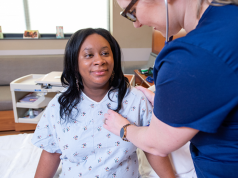 HOUSTON – Women who have experienced an amniotic fluid embolism, a rare but severe complication in pregnancy, are needed to participate in a new study at Baylor College of Medicine (www.bcm.edu) that seeks to understand the genes and mechanisms associated with the complication.
HOUSTON – Women who have experienced an amniotic fluid embolism, a rare but severe complication in pregnancy, are needed to participate in a new study at Baylor College of Medicine (www.bcm.edu) that seeks to understand the genes and mechanisms associated with the complication.
With support from the Amniotic Fluid Embolism Foundation (www.afesupport.org), researchers at Baylor have established a new, one-of-a-kind international patient registry to help further research about this poorly understood and often-fatal pregnancy complication, said Dr. Gary A. Dildy III, professor of obstetrics and gynecology in the section of maternal fetal medicine at BCM and vice chair of quality & patient safety for the department of obstetrics and gynecology at BCM. “This registry is an important step in beginning to understand this devastating and clinically challenging complication.”
Dildy also serves as chief quality officer of obstetrics and gynecology at the Texas Children’s Pavilion for Women.
Amniotic fluid embolisms are obstetric emergencies in which amniotic fluid (the fluid that surrounds a baby in the uterus during pregnancy), fetal cells, hair or other debris enters the mother’s blood stream and triggers an allergic-like reaction. This reaction then results in heart and lung collapse, blood clotting and bleeding disorders and, often, death.
Researchers at Baylor will collect comprehensive information by reviewing the medical records of women who have experienced an amniotic fluid embolism.
“The collection of this information will allow us to pursue future investigations pertaining to the genes and mechanisms associated with an amniotic fluid embolism,” said Miranda Klassen, survivor and founder of the AFE Foundation. “The AFE Foundation patient registry will allow for greater visibility into incidence rates, survival rates and commonalities among those affected. It will also provide a comprehensive database that will be used as the basis for clinical research on amniotic fluid embolism.”
Survivors and family members of women who have died of amniotic fluid embolism should contact 713-873-3041 or email aferegistry@bcm.edu for more information on participation.



